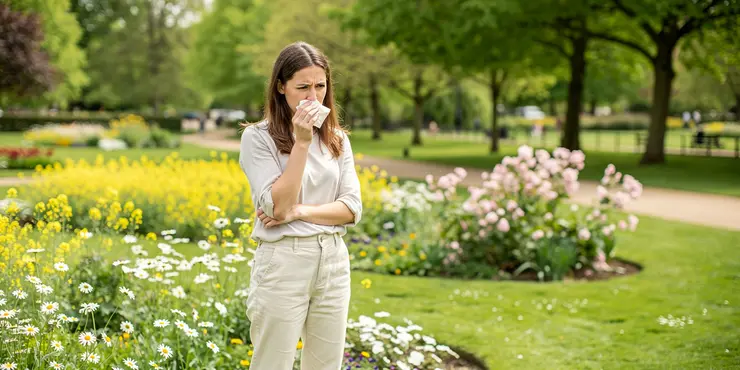
Find Help
More Items From Ergsy search
-
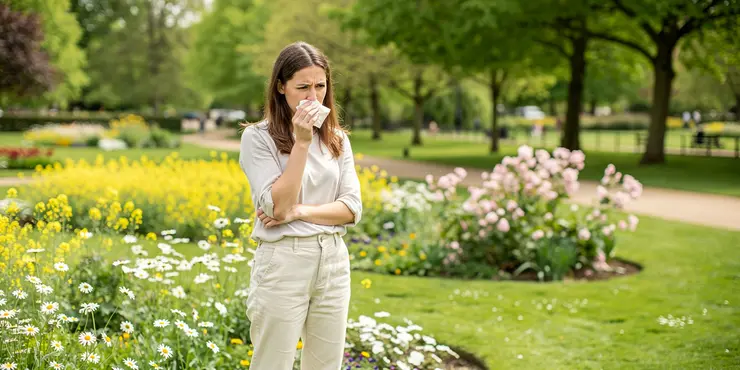
Are some people more prone to hay fever?
Relevance: 100%
-
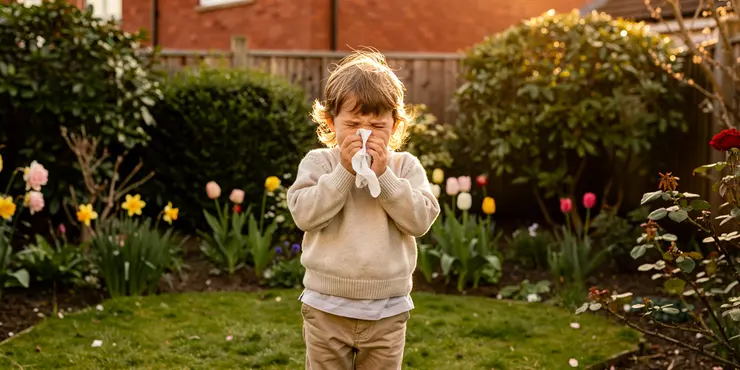
Can children develop hay fever?
Relevance: 80%
-
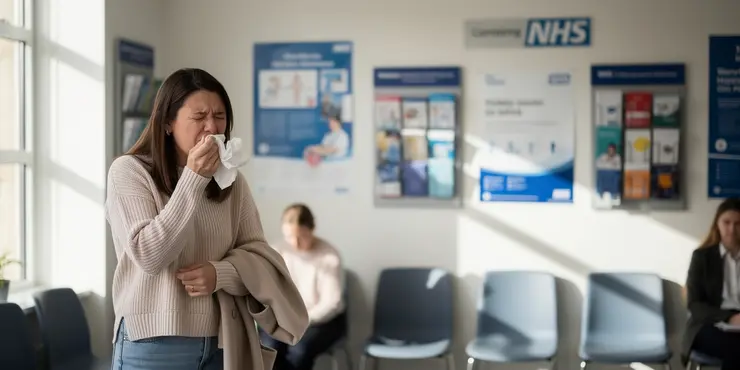
What is hay fever?
Relevance: 79%
-

Hay fever advice | NHS
Relevance: 74%
-
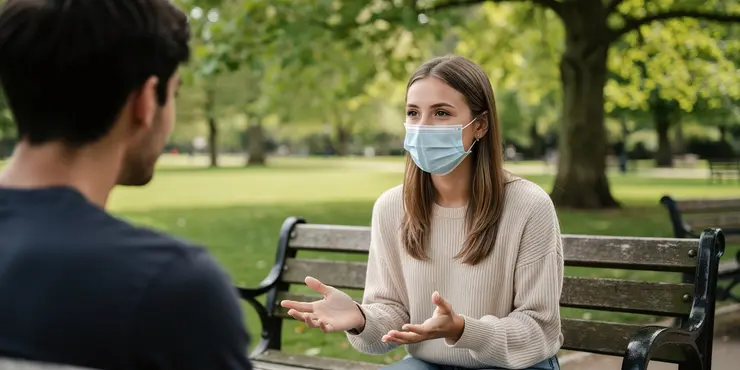
Do masks help with hay fever?
Relevance: 74%
-
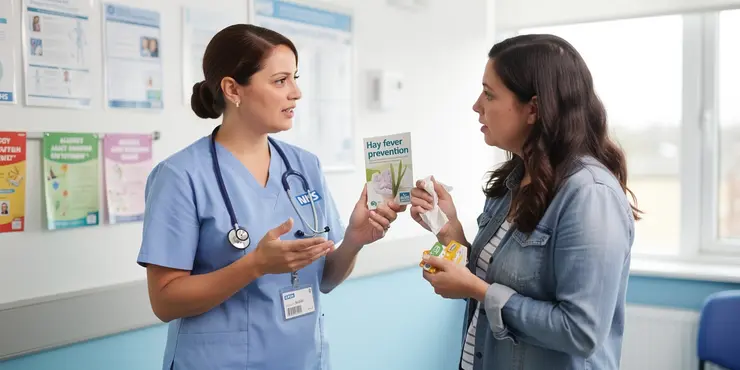
Can hay fever be prevented?
Relevance: 74%
-

What are the common symptoms of hay fever?
Relevance: 73%
-
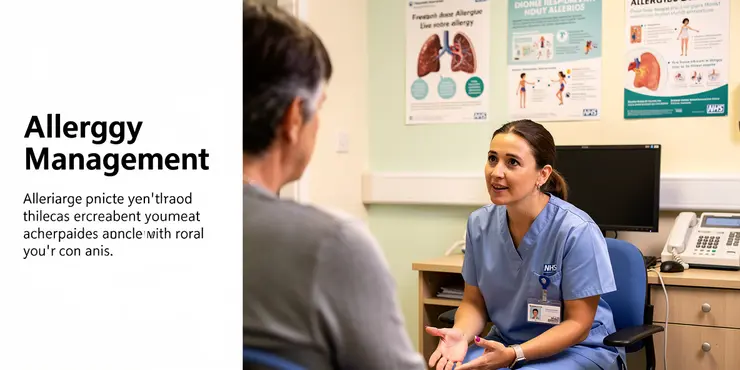
Is there a link between hay fever and asthma?
Relevance: 73%
-

Can hay fever occur year-round?
Relevance: 72%
-

Do pets contribute to hay fever?
Relevance: 70%
-
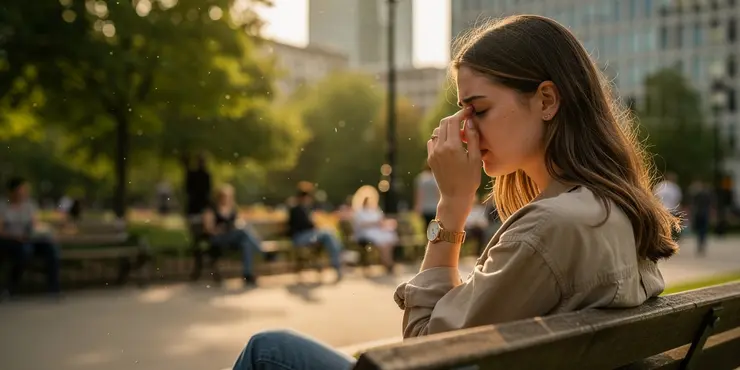
Is hay fever more common in urban areas?
Relevance: 70%
-

Can diet influence hay fever symptoms?
Relevance: 69%
-

Antihistamines how they work with hay fever
Relevance: 69%
-
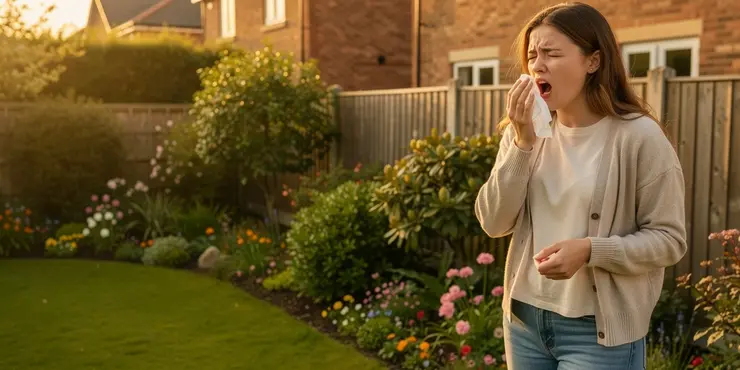
Experts Warn of Rising Hay Fever Cases as Pollen Counts Surge
Relevance: 69%
-

Can hay fever symptoms mimic other conditions?
Relevance: 68%
-
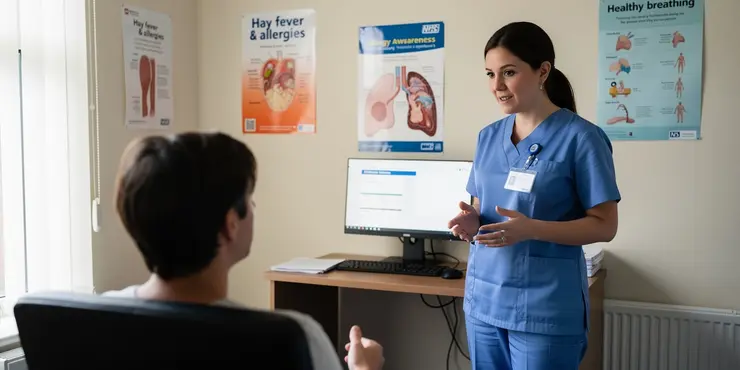
Do all plants produce pollen that causes hay fever?
Relevance: 68%
-
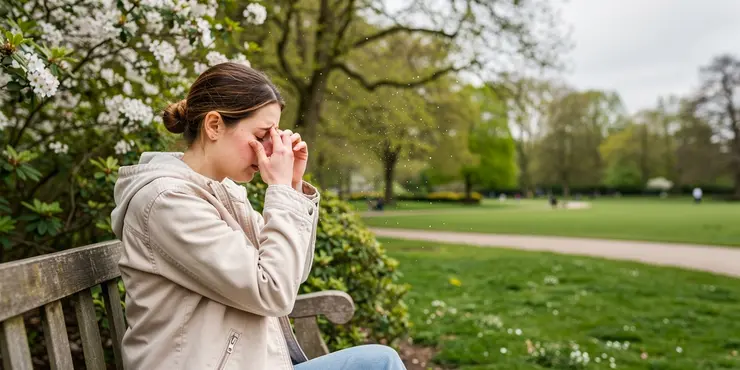
How does pollen affect people with hay fever?
Relevance: 68%
-

Why are experts warning of rising hay fever cases?
Relevance: 67%
-

Self care - hay fever itchy eyes
Relevance: 67%
-

Can mosquito screens help reduce hay fever symptoms?
Relevance: 61%
-

Are there any treatments for hay fever?
Relevance: 54%
-

How long does a typical hay fever season last?
Relevance: 46%
-

Are some people more prone to sunburn?
Relevance: 37%
-

Caring for a child with fever | NHS
Relevance: 32%
-

Why are newborns more prone to jaundice than adults?
Relevance: 31%
-

Can dengue fever be contracted in the UK?
Relevance: 31%
-
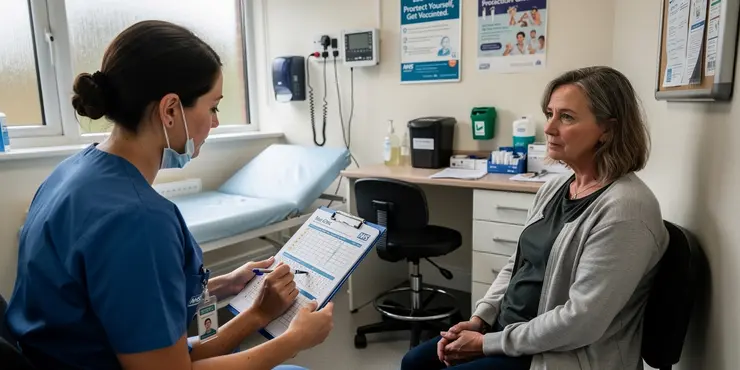
Is there a risk of yellow fever being spread by mosquitoes in the UK?
Relevance: 31%
-

How to treat glandular fever | NHS
Relevance: 31%
-
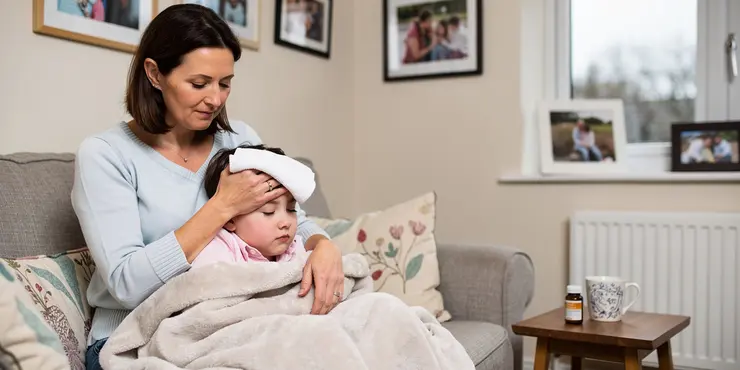
Which medication should be avoided for children with fevers?
Relevance: 29%
-
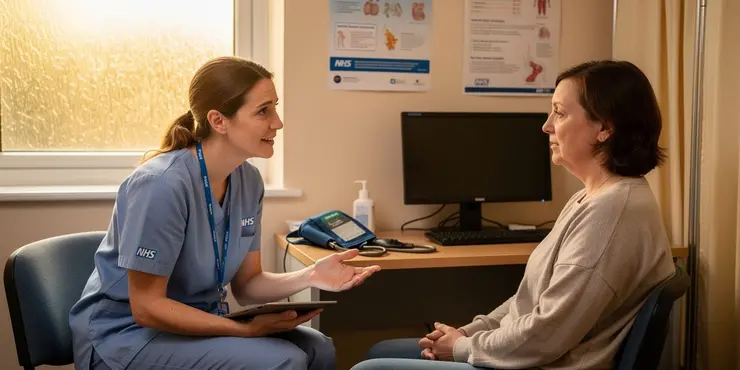
What is Dengue Fever?
Relevance: 26%
-

Can lifestyle changes help manage pain and fever during pregnancy?
Relevance: 25%
-

Are there specific banking services more prone to opaque fee structures?
Relevance: 25%
-
Can Dengue fever be transmitted through blood transfusions?
Relevance: 24%
-

What causes nettle rash?
Relevance: 16%
-

What are some common conditions treated with homeopathy?
Relevance: 14%
-

Can a stoma bag cause infections?
Relevance: 14%
-
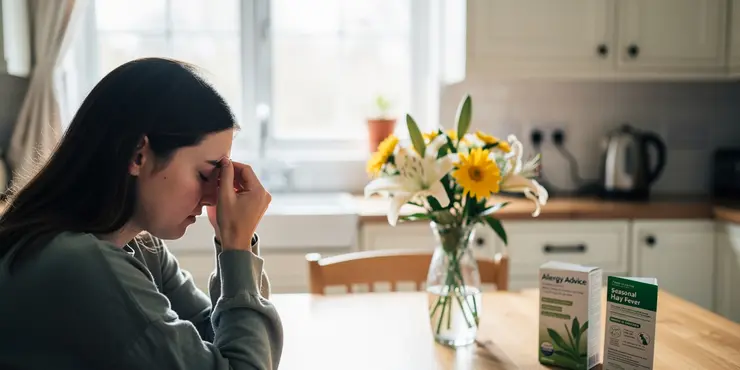
Dealing with Seasonal Allergies
Relevance: 14%
-

Are there safer alternatives to paracetamol for pregnant individuals experiencing pain or fever?
Relevance: 14%
-
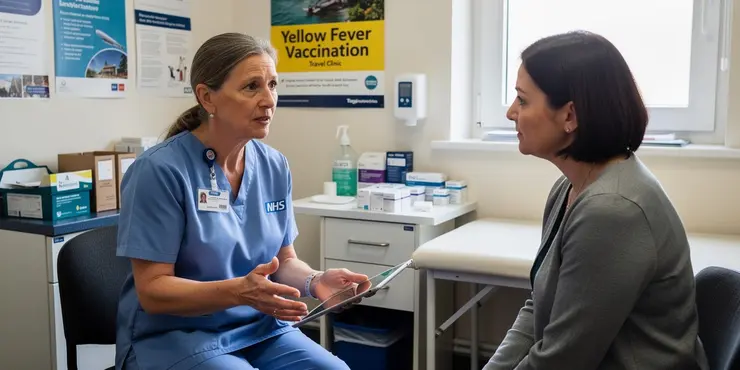
Are any vaccines available in the UK for mosquito-borne diseases?
Relevance: 13%
-

Who is at risk of developing eczema?
Relevance: 13%
Overview of Hay Fever
Hay fever, also known as allergic rhinitis, is a common allergic condition that affects a significant portion of the population, particularly during high pollen seasons like spring and summer. It is characterized by symptoms such as sneezing, a runny or blocked nose, itchy eyes, and throat. Understanding who might be more susceptible to hay fever can help in managing and mitigating its effects.
Genetic Factors
Genetic predisposition plays a significant role in determining an individual's susceptibility to hay fever. Studies suggest that if one or both parents suffer from allergies or hay fever, their children are more likely to be affected. This familial tendency towards allergies is indicative of the complex interplay between genetics and environmental factors. The immune system's response to allergens in genetically predisposed individuals tends to be exaggerated, leading to the classic symptoms of hay fever.
Environmental Influences
Environmental factors significantly influence the likelihood of developing hay fever. People living in urban areas with high levels of pollution may be more prone to hay fever due to the heightened exposure to pollutants that can exacerbate allergic reactions. Additionally, individuals who spend a lot of time outdoors during peak pollen seasons are at increased risk. Environmental changes such as prolonged exposure to certain allergens can increase the likelihood of developing hay fever over time.
Age and Lifestyle Factors
Age can play a role in hay fever susceptibility. It often starts in childhood or during the teenage years, with some individuals "outgrowing" the condition, while others may experience it for the first time as adults. Lifestyle choices, such as smoking, can aggravate or trigger hay fever symptoms, as tobacco smoke irritates the respiratory system. Maintaining a healthy lifestyle and avoiding smoking can reduce the likelihood of developing hay fever.
Impact of Climate Change
Climate change is having an increasing impact on the prevalence of hay fever. Warmer temperatures and increased levels of carbon dioxide are causing longer pollen seasons and higher pollen counts. People who were previously only mildly affected by hay fever may experience more severe symptoms, and those without prior symptoms might develop the condition. The changing climate is expected to continue influencing hay fever patterns in the UK, making it an area of concern for healthcare providers and individuals alike.
Conclusion
In conclusion, while hay fever affects many people, some are more prone to the condition due to genetic factors, environmental influences, age, lifestyle choices, and climate change. Understanding these elements can help individuals take proactive steps to manage their symptoms and reduce the impact of hay fever on their daily lives. In the UK, where pollen levels can vary greatly, awareness and preparation are key to coping with the challenges of hay fever.
Overview of Hay Fever
Hay fever is also called allergic rhinitis. It is a common condition caused by allergies. Many people have it, especially in spring and summer when pollen is high. People with hay fever sneeze a lot. They might have a runny or blocked nose. Their eyes and throat might be itchy. Some people are more likely to get hay fever. Knowing this can help manage its effects.
Genetic Factors
Genes from parents can make someone more likely to get hay fever. If a parent has allergies, their children might have them too. This shows how genes and the environment can affect us. People with certain genes might react more to things that cause allergies. This leads to hay fever symptoms like sneezing and itching.
Environmental Influences
The place where someone lives can affect if they get hay fever. People in cities with a lot of pollution might have more allergies. Pollution can make allergies worse. Also, if a person is outside a lot during pollen season, they can get hay fever. Changes in the environment can make hay fever more likely over time.
Age and Lifestyle Factors
Age can affect hay fever. It can start when someone is a child or teenager. Some people stop having it as they grow older, while others might get it for the first time as adults. Choices like smoking can make hay fever worse because smoke irritates the nose and throat. Staying healthy and not smoking can help lower the chance of getting hay fever.
Impact of Climate Change
Climate change affects hay fever. Warmer weather and more carbon dioxide cause more pollen. This makes pollen season longer. People with mild hay fever might find their symptoms getting worse. Some people might get hay fever when they did not have it before. In the UK, the changing climate affects hay fever, and it is a concern for doctors and individuals.
Conclusion
In conclusion, hay fever affects many people for different reasons: genes, environment, age, lifestyle, and climate change. Knowing these can help people manage their symptoms. In the UK, pollen levels change a lot, so being prepared is important. Using tools like air filters, wearing sunglasses, and checking pollen forecasts can help manage hay fever better.
Frequently Asked Questions
What is hay fever?
Hay fever, also known as allergic rhinitis, is an allergic reaction to pollen or other allergens such as dust mites and pet dander.
Are some people more prone to hay fever?
Yes, some people are genetically predisposed to hay fever due to a family history of allergies.
What are the common symptoms of hay fever?
Common symptoms include sneezing, runny or blocked nose, itchy eyes, and throat irritation.
Can hay fever be hereditary?
Yes, hay fever can run in families. If parents have allergies, their children are more likely to develop hay fever.
Is there a specific age group more affected by hay fever?
Hay fever can occur at any age but is most commonly diagnosed in children and young adults.
Can lifestyle factors influence the likelihood of getting hay fever?
Yes, factors such as smoking, pollution exposure, or living in high-pollen areas can increase the risk of hay fever.
How does the immune system play a role in hay fever?
In hay fever, the immune system overreacts to harmless substances like pollen, treating them as threats.
Can diet have an impact on hay fever susceptibility?
While a specific diet doesn't cause hay fever, a balanced diet supporting the immune system may help manage symptoms.
Are people with asthma more likely to have hay fever?
Yes, individuals with asthma often have allergies, including hay fever, due to shared underlying immune system mechanisms.
Can stress influence hay fever symptoms?
Stress does not directly cause hay fever but can exacerbate symptoms by weakening the immune system.
Does hay fever occur year-round or seasonally?
Hay fever can be seasonal, triggered by specific pollens, or perennial, occurring year-round due to indoor allergens.
Is there a connection between hay fever and eczema?
Yes, hay fever, asthma, and eczema are part of the 'atopic triad,' and individuals with one condition may be predisposed to the others.
Can moving to a new area affect my hay fever symptoms?
Moving to a place with different pollen types can change the severity or type of hay fever symptoms experienced.
Are indoor allergens as significant as outdoor ones for hay fever?
For some, indoor allergens like dust mites, mold, and pet dander are just as important and can cause perennial symptoms.
Can climate affect the prevalence of hay fever?
Yes, areas with longer pollen seasons or certain climates may have higher rates of hay fever.
How is hay fever diagnosed?
Hay fever is diagnosed based on medical history, symptoms, and sometimes skin prick or blood tests for allergies.
What treatments are available for hay fever?
Treatments include antihistamines, nasal sprays, decongestants, and avoiding known allergens.
Are there any lifestyle changes that can help with hay fever?
Keeping windows closed, using air purifiers, and avoiding outdoor activities during high pollen counts can help.
Can hay fever severity change over a person's lifetime?
Yes, symptoms can vary with age, and some people may outgrow their allergies, while others may worsen.
Is there a cure for hay fever?
There is currently no cure for hay fever, but symptoms can be effectively managed with medication and lifestyle changes.
What is hay fever?
Hay fever is when you sneeze and have a runny nose because of plants. It can make your eyes itchy too.
Plants make tiny bits called pollen. Pollen is in the air, especially in spring and summer. Some people are sensitive to pollen.
If you have hay fever, try these tips:
- Stay indoors when there is lots of pollen outside.
- Wear sunglasses to protect your eyes.
- Ask an adult about special medicine that can help.
Hay fever is when your body has a bad reaction to things like pollen, dust, or pet fur.
Do some people get hay fever more easily?
Yes, some people have a higher chance of getting hay fever because their family members also have allergies.
What signs show you have hay fever?
Hay fever can make you sneeze a lot. It can make your nose itchy or runny. Your eyes might feel itchy or watery too. Sometimes, your throat or mouth feels itchy. You might also feel tired.
If you think you have hay fever, try talking to a doctor. They can help you feel better.
Common signs are sneezing, a runny or stuffy nose, itchy eyes, and a sore throat.
Can you get hay fever from your family?
Hay fever is when you sneeze or get a runny nose from things like pollen. Sometimes, if your parents or family members have hay fever, you might get it too. This is called hereditary, which means passed down from your family.
Remember, not everyone in a family will have hay fever. But it's possible if your family members have it, you might have it too.
If you have hay fever, you can talk to a doctor. They can help you feel better.
You can also use special glasses or a mask outside to help keep pollen away. Keeping windows closed and using air filters can help too.
Yes, hay fever can run in families. If parents get allergies, their children might get hay fever too.
Who gets hay fever more?
Some people get hay fever more than others.
Hay fever can happen to kids and adults. But it often starts when people are kids or teenagers.
If you want help reading, you can use tools like reading apps or ask someone to read with you.
Hay fever can happen to people of any age. It is found most often in kids and young adults.
Can how you live your life make you more likely to get hay fever?
Hay fever is a sneezy and itchy feeling you get, usually from pollen.
Here are some things that might help:
- Stay inside: When pollen counts are high, try to stay indoors.
- Close windows: Keeping windows shut keeps pollen out.
- Wear sunglasses: They can stop pollen from getting into your eyes.
- Wash up: Shower and change clothes after being outside.
These tips can help you feel better during hay fever season.
Yes, things like smoking, being around pollution, or living where there is a lot of pollen can make hay fever worse.
Here are some things that might help:
- Avoid places with lots of smoke or pollution.
- Stay indoors when pollen levels are high.
- Wear a mask outside if you need to.
- Try using special medicines for hay fever.
How does the body's defense help in hay fever?
Your body has a defense system. It keeps you safe from sickness.
Some people have hay fever. This means their body thinks tiny things like pollen are bad.
The defense system tries to fight pollen. This makes you have a runny nose, itchy eyes, and sneezes.
If you have hay fever, you can try:
- Staying indoors when pollen is high.
- Wearing sunglasses to keep pollen out of your eyes.
- Using a tissue to catch nose drips.
- Talking to a doctor who can help with medicine.
Hay fever happens when your body's defense system gets confused. It thinks that things like pollen, which are not dangerous, are bad for you.
Can what you eat affect how often you get hay fever?
Some people get hay fever when plants release pollen. Eating certain foods might help with hay fever. It's good to eat lots of fruits and vegetables. They can make you feel better. Drinking lots of water helps, too.
If hay fever makes you feel bad, ask a grown-up to help you:
- Try different foods to see what helps you.
- Use special air filters at home.
- Talk to a doctor or a nurse.
Eating certain foods doesn't make you get hay fever. But eating healthy foods can help your body feel better and fight hay fever symptoms.
Do people with asthma also get hay fever more often?
Yes, people with asthma often have allergies too. This can include hay fever. This happens because of how their bodies fight germs.
Can feeling stressed change hay fever symptoms?
When you feel stressed, your body may react in different ways. This could make hay fever symptoms worse. Stress might make you sneeze more or feel itchy eyes.
To feel better, try some calming activities like:
- Deep breathing exercises
- Listening to your favorite music
- Going for a walk
Stress does not make hay fever happen, but it can make the symptoms worse because it makes the body's defenses weaker.
Does hay fever happen all year or only in some seasons?
Hay fever can happen at different times.
Sometimes it happens only in spring, summer, or fall. This is when plants make pollen.
Some people have hay fever all year. This can be from dust or pets.
If you have trouble reading, you can try using:
- Text-to-speech tools that read text out loud.
- Pictures to help understand words.
- Asking for help to read or explain words.
Hay fever can happen in different ways. Sometimes it happens in certain seasons because of pollen from plants. Other times, it can happen all year because of things inside like dust.
Are hay fever and eczema linked?
Do hay fever and eczema happen together? Hay fever makes you sneeze and have a runny nose. Eczema makes your skin red and itchy. Some people have both problems.
If you need help, use pictures or ask someone to explain it to you. You can write down what you learn in a notebook.
Yes, hay fever, asthma, and eczema are like a trio of conditions called the 'atopic triad.' If you have one, you might get the others too.
Will moving to a new place change my hay fever?
Hay fever is when you sneeze and have a runny nose because of things like pollen. Moving to a new place can sometimes make hay fever better or worse. Here are some things to try:
- Check how much pollen is in the air where you are moving.
- Talk to a doctor about your hay fever.
- Try using apps that tell you pollen levels every day.
- Wear sunglasses outside to help keep pollen out of your eyes.
When you move to a new place, the pollen can be different. This can change how bad your hay fever is or what kind of hay fever you have.
Are inside allergens as bad as outside ones for hay fever?
- Inside allergens: These are things like dust and pet hair that make you sneeze.
- Outside allergens: These are things like pollen from flowers and trees that also make you sneeze.
Allergens inside and outside can both make hay fever bad. Here are some tips to help:
- Keep your home clean to reduce dust.
- Use allergy pillows and covers on your bed.
- Check the pollen forecast and close windows when pollen is high.
- Try using air filters or purifiers at home.
Indoor things like dust mites, mold, and pet fur can cause allergies all year round for some people.
Does weather change how many people get hay fever?
The weather can change how often people get hay fever. When it is warmer or windy, plants make more pollen. This can cause more hay fever.
If you have hay fever, here are some tips:
- Check the weather. Stay inside if there is a lot of pollen.
- Keep windows shut to stop pollen from coming inside.
- Wash your face or change clothes after being outside.
These tips can help you feel better if you have hay fever.
Yes, places with long pollen seasons or special weather might have more hay fever.
How do doctors know if you have hay fever?
If you sneeze or get itchy eyes when there is a lot of pollen, you might have hay fever.
To find out, you can go to the doctor.
The doctor will ask you some questions about how you feel.
The doctor might also do some simple tests to see if pollen makes you feel unwell.
Bring someone with you to the doctor if it helps you feel more comfortable.
You can also write down how you feel before you see the doctor. This can help you remember what to say.
Doctors can tell if you have hay fever by asking about your health and how you feel. They might also do tests on your skin or blood to check for allergies.
How can you help with hay fever?
Here are ways to feel better:
- Take medicine called antihistamines to help with sneezing and itching.
- Use nasal sprays to help clear your nose.
- Try decongestants to help you breathe easier.
- Stay away from things that make you sneeze or itch, like dust or pollen.
Can changing how I live help with hay fever?
Yes, you can make some changes to feel better if you have hay fever. Here are some tips:
- Stay inside when there is a lot of pollen outside.
- Keep windows closed on days with high pollen.
- Take a shower and change your clothes after being outside.
- Use sunglasses to stop pollen from getting in your eyes.
Tools that might help:
- A pollen calendar to know high pollen days.
- A vacuum cleaner with a good filter.
Try these changes to feel better with hay fever!
Shut the windows in your house. Use a machine called an air purifier to clean the air. Avoid going outside when there is a lot of pollen in the air. These things can help you feel better.
Can hay fever get better or worse as you grow older?
Hay fever can change as you get older. It might get better or it might get worse. - **Take notes**: Write down how you feel each year. - **Ask for advice**: Talk to a doctor if you have questions. - **Use apps**: Try apps that help track your symptoms. These tools can help you understand how hay fever changes for you.Yes, allergy symptoms can change as you get older. Some people stop having allergies, but others might find their allergies get worse.
Can hay fever be fixed?
Hay fever can't be completely fixed, but you can feel better with medicine and by changing some things you do every day.
Useful Links
This website offers general information and is not a substitute for professional advice.
Always seek guidance from qualified professionals.
If you have any medical concerns or need urgent help, contact a healthcare professional or emergency services immediately.
Some of this content was generated with AI assistance. We’ve done our best to keep it accurate, helpful, and human-friendly.
- Ergsy carfully checks the information in the videos we provide here.
- Videos shown by Youtube after a video has completed, have NOT been reviewed by ERGSY.
- To view, click the arrow in centre of video.
- Most of the videos you find here will have subtitles and/or closed captions available.
- You may need to turn these on, and choose your preferred language.
- Go to the video you'd like to watch.
- If closed captions (CC) are available, settings will be visible on the bottom right of the video player.
- To turn on Captions, click settings .
- To turn off Captions, click settings again.
More Items From Ergsy search
-

Are some people more prone to hay fever?
Relevance: 100%
-

Can children develop hay fever?
Relevance: 80%
-

What is hay fever?
Relevance: 79%
-

Hay fever advice | NHS
Relevance: 74%
-

Do masks help with hay fever?
Relevance: 74%
-

Can hay fever be prevented?
Relevance: 74%
-

What are the common symptoms of hay fever?
Relevance: 73%
-

Is there a link between hay fever and asthma?
Relevance: 73%
-

Can hay fever occur year-round?
Relevance: 72%
-

Do pets contribute to hay fever?
Relevance: 70%
-

Is hay fever more common in urban areas?
Relevance: 70%
-

Can diet influence hay fever symptoms?
Relevance: 69%
-

Antihistamines how they work with hay fever
Relevance: 69%
-

Experts Warn of Rising Hay Fever Cases as Pollen Counts Surge
Relevance: 69%
-

Can hay fever symptoms mimic other conditions?
Relevance: 68%
-

Do all plants produce pollen that causes hay fever?
Relevance: 68%
-

How does pollen affect people with hay fever?
Relevance: 68%
-

Why are experts warning of rising hay fever cases?
Relevance: 67%
-

Self care - hay fever itchy eyes
Relevance: 67%
-

Can mosquito screens help reduce hay fever symptoms?
Relevance: 61%
-

Are there any treatments for hay fever?
Relevance: 54%
-

How long does a typical hay fever season last?
Relevance: 46%
-

Are some people more prone to sunburn?
Relevance: 37%
-

Caring for a child with fever | NHS
Relevance: 32%
-

Why are newborns more prone to jaundice than adults?
Relevance: 31%
-

Can dengue fever be contracted in the UK?
Relevance: 31%
-

Is there a risk of yellow fever being spread by mosquitoes in the UK?
Relevance: 31%
-

How to treat glandular fever | NHS
Relevance: 31%
-

Which medication should be avoided for children with fevers?
Relevance: 29%
-

What is Dengue Fever?
Relevance: 26%
-

Can lifestyle changes help manage pain and fever during pregnancy?
Relevance: 25%
-

Are there specific banking services more prone to opaque fee structures?
Relevance: 25%
-
Can Dengue fever be transmitted through blood transfusions?
Relevance: 24%
-

What causes nettle rash?
Relevance: 16%
-

What are some common conditions treated with homeopathy?
Relevance: 14%
-

Can a stoma bag cause infections?
Relevance: 14%
-

Dealing with Seasonal Allergies
Relevance: 14%
-

Are there safer alternatives to paracetamol for pregnant individuals experiencing pain or fever?
Relevance: 14%
-

Are any vaccines available in the UK for mosquito-borne diseases?
Relevance: 13%
-

Who is at risk of developing eczema?
Relevance: 13%


